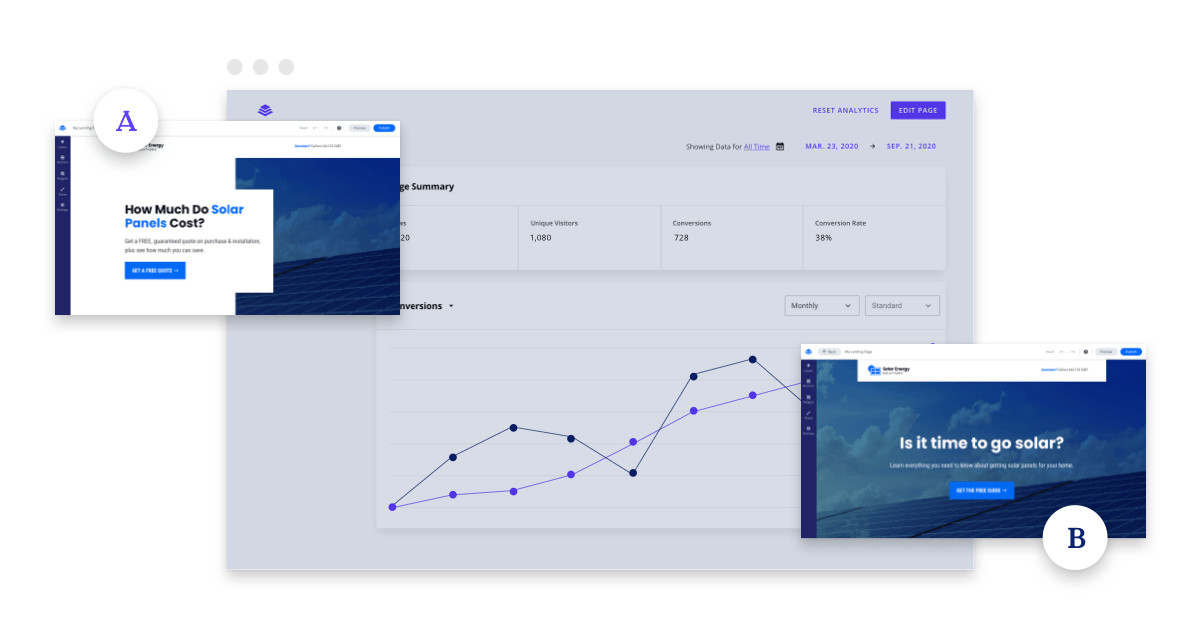One question that often comes up in the world of online marketing is the difference between landing pages vs. homepages. While these two types of pages may seem similar at first glance, they actually serve very different purposes and have unique characteristics. Understanding the difference between a landing page and a homepage is crucial for maximizing the effectiveness of your website and ensuring that you’re meeting the needs of your target audience.
As a business owner or marketer, you know that having a strong online presence is crucial to attracting and retaining customers. One key aspect of this is your website, which serves as the hub of your online marketing efforts. But with so many different types of pages and elements to consider, it can be tough to know where to focus your time and resources.
In this post, we’ll dive deep into the topic of landing pages vs homepages. We’ll explore what these pages are, how they differ, and when it’s best to use each one. We’ll also provide tips and best practices for creating and optimizing these pages to drive results for your business. By the end of this post, you’ll have a clear understanding of the role that landing pages and homepages play in your online marketing strategy.
What is a Landing Page?
A landing page is a standalone web page, created specifically for the purpose of a marketing or advertising campaign. It is designed to direct the visitor to take a specific action, such as making a purchase, filling out a form, or signing up for a newsletter. Landing pages are distinct from the rest of a website and do not typically have global navigation links.
There are many reasons why businesses might use landing pages. Some common examples include:
- Promoting a special offer or discount
- Collecting leads for a newsletter or email list
- Driving registrations or sign-ups for an event or webinar
- Selling a product or service online
The key elements of a landing page include:
- A strong, compelling headline that clearly communicates the value proposition and motivates the visitor to take action
- Copy that explains the benefits of the offer and addresses any objections or questions the visitor might have
- A call-to-action (CTA) that tells the visitor exactly what to do next, such as “Sign Up Now” or “Buy Now”
- Supporting images, videos, or other media that help to illustrate the offer and its value
One tool that many businesses use to create effective landing pages is Leadpages. Leadpages is a drag-and-drop landing page builder that allows you to quickly and easily create professional-quality landing pages without the need for coding skills. If you’re looking for a solution to help you create high-converting landing pages, Leadpages is definitely worth checking out.

What is a Homepage?
A homepage is the main page of a website, and it serves as the entry point for most visitors. The purpose of a homepage is to provide an overview of the website and its content, and to guide visitors to other areas of the site.
The key elements of a homepage include:
- A navigation menu that allows visitors to easily access different sections and pages of the website
- Branding elements, such as a logo and color scheme, that help to establish the website’s identity and create a cohesive look and feel
- Featured content that showcases the most important or popular items on the website, such as blog posts, products, or services
A homepage serves as the hub of a website, linking to other pages and sections. It typically includes links to the most important or popular areas of the site, as well as links to the website’s social media profiles and contact information.
It’s important for a homepage to be well-designed and user-friendly, as it is often the first impression that visitors have of a website. A homepage should clearly communicate the purpose and value of the website, and provide a clear path for visitors to follow as they explore the site.
Key Differences Between Landing Pages and Homepages

While both landing pages and homepages are important parts of a website, they serve very different purposes and have unique characteristics. Here are some key differences between landing pages and homepages:
- Purpose: The main purpose of a landing page is to convert visitors into leads or customers, while the main purpose of a homepage is to provide an overview of the website and guide visitors to other areas of the site.
- Design: Landing pages are typically more focused and streamlined, with a single call-to-action and minimal distractions. Homepages, on the other hand, are usually more comprehensive and include a variety of elements, such as a navigation menu, branding, and featured content.
- Function: Landing pages are typically designed to be standalone pages, separate from the rest of the website. Homepages, on the other hand, are part of the main website and often include links to other pages and sections.
These differences impact the user experience and the effectiveness of each type of page. Landing pages are more effective at converting visitors into leads or customers because they are focused on a specific action and have minimal distractions. Homepages, on the other hand, are better at providing an overview of the website and guiding visitors to other areas of the site, but they may not be as effective at converting visitors into leads or customers.
It’s important for businesses and marketers to understand these differences and use the appropriate type of page for their marketing goals. By choosing the right type of page for the right purpose, you can optimize the user experience and drive the desired results for your business.
When to Use a Landing Page vs. a Homepage
So, when is it appropriate to use a landing page or a homepage for a particular marketing campaign or business goal? Here are some guidelines to help you decide:
- Use a landing page when:
- You have a specific offer or promotion that you want to promote
- You want to collect leads or sell a product or service online
- You want to test the effectiveness of different elements, such as headlines or calls-to-action, on a particular page
- Use a homepage when:
- You want to provide an overview of your website and its content
- You want to guide visitors to other areas of your site
- You want to establish your brand identity and create a cohesive look and feel for your website
There are pros and cons to both options. Landing pages can be highly effective at converting visitors into leads or customers, but they may not provide as much context or information about your business as a homepage. Homepages, on the other hand, are great for providing an overview of your website and guiding visitors to other areas, but they may not be as focused or effective at converting visitors into leads or customers.
Ultimately, the choice between a landing page and a homepage will depend on your specific marketing goals and the needs of your target audience. By understanding the strengths and limitations of each type of page, you can make an informed decision about which one is best for your business.
Best Practices for Landing Pages and Homepages
To get the most out of your landing pages and homepages, it’s important to follow best practices for creating and optimizing these pages. Here are some tips to help you get started:
- Keep it simple: Both landing pages and homepages should be focused and easy to navigate. Avoid cluttering these pages with too many elements or distractions, and focus on delivering a clear and concise message.
- Use compelling headlines: The headline is one of the most important elements of a landing page or homepage, as it sets the tone for the rest of the page and determines whether visitors will stay or leave. Make sure your headlines are clear, compelling, and relevant to your target audience.
- Use strong calls-to-action: A call-to-action (CTA) is a button or link that tells visitors what to do next. Make sure your CTAs are clear, prominent, and actionable. Avoid using vague or confusing language, and consider using buttons or other visual elements to make them stand out.
- Use media to support your message: Both landing pages and homepages can benefit from the use of media, such as images, videos, or audio. Choose media that helps to illustrate your message and adds value for your visitors.
- Test and optimize: Testing and analytics are crucial for understanding the performance of your landing pages and homepages. Use tools like A/B testing to compare different versions of your pages and see which ones perform best. Use analytics to track key metrics, such as conversion rates and bounce rates, and use the insights you gain to continuously optimize your pages.
By following these best practices, you can create and optimize landing pages and homepages that drive results for your business.
Conclusion
In this post, we’ve explored the differences between landing pages and homepages and provided guidance on when to use each type of page for your marketing campaigns and business goals. We’ve also discussed best practices for creating and optimizing these pages to drive results.
To summarize, here are the key points to remember:
- Landing pages are standalone pages designed to convert visitors into leads or customers, while homepages are the main page of a website and provide an overview of the site and its content.
- The purpose, design, and function of landing pages and homepages differ, and it’s important to choose the right type of page for the right purpose.
- Both landing pages and homepages can be optimized for maximum effectiveness through the use of strong headlines, clear calls-to-action, compelling media, and testing and analytics.
We hope that these concepts have been helpful and that you’re now ready to put them into practice. Whether you’re creating a new landing page or homepage, or optimizing an existing one, these principles will help you drive results for your business.
If you’d like to learn more about landing pages and homepages, there are many excellent resources available online. Some good places to start include the blog of your chosen landing page builder (such as Leadpages), as well as industry blogs and online marketing forums. Happy optimizing!



